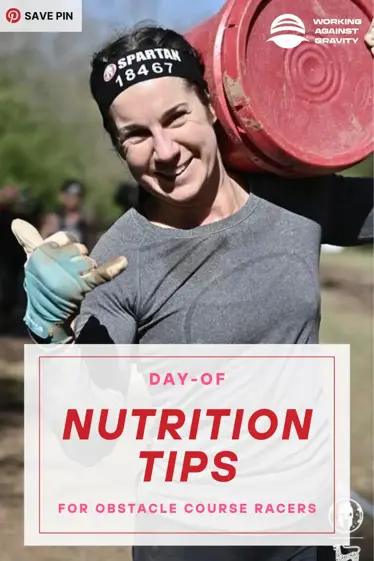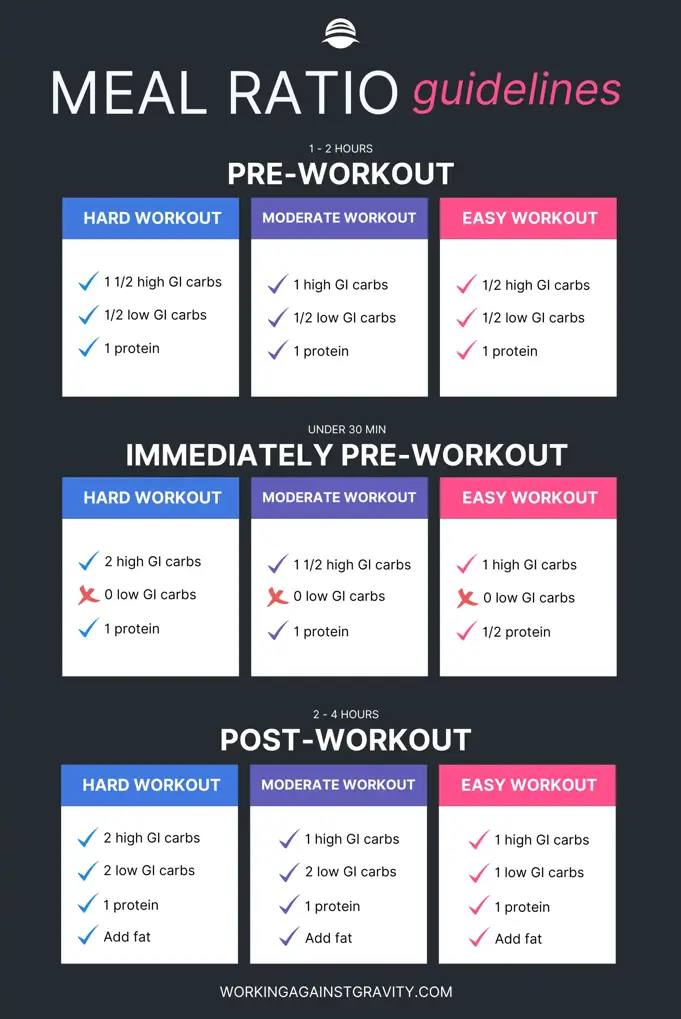Nutrition can make or break your performance in any physically demanding sport—restricting your ability to perform at your best or catapulting you to the top of the podium. Obstacle course racing (OCR) is no exception. These race-day nutrition tips for OCR will help you gain a competitive edge.

Why is Nutrition for OCR Important?
Obstacle course racing is an intense sport that challenges your strength, endurance, agility, and mental resilience. Nutrition impacts energy production and utilization, muscle function, endurance, electrolyte balance, recovery and adaptation, and more.
Advertisement
In other words, the foods you put in your body directly impact your performance throughout training and on race day.
Intentional nutrition strategies should be employed throughout your regular training as staying fueled for exertion and recovery will ultimately play a paramount role in day-of performance. But race-day fueling procedures are still important and can give you the edge over your competitors and your own past performances.
Day-Of Nutrition Tips for OCR
These nutrition tips will help you optimize your performance at your next obstacle course race.
1. Plan Ahead
Know what foods and food spots are available in your area. This is especially important if you’re traveling for your race. Here are a few guiding questions:
Advertisement
- What food should I bring with me that I may not be able to get there?
- What restaurants and grocery stores are close to my event?
- What meals are available at those restaurants?
- What go-tos can I grab from a grocery store?
- What amenities are available at my place of stay? (If you’re in a hotel, does it have a mini fridge? Kitchenette?)
Planning ahead also involves knowing what intra-race options are available on the course (hydration and fuel-wise) and packing your favorite go-to fuel sources if necessary. We’ll tackle intra-race carbohydrate and hydration recommendations below.
2. Prioritize Carbohydrates
Carbohydrates are the name of the game when it comes to optimal fueling for your obstacle course race. The amount of carbs you need depends on a host of factors, including (but not limited to) your current weight, race length, and your performance and body composition goals.
At WAG Nutrition, our expert coaches will help determine the amount of carbohydrates you need based on these biometric factors.
Advertisement
Carbohydrate Recommendations Before Your Obstacle Course Race
The generally accepted range for carbohydrate intake is 3-12g/kg of body weight/day for healthy-weight individuals with weight maintenance goals [1]. These recommendations are based on the intensity of your activity, not the duration. So, someone with a lower activity level would skew toward the lower end of the recommended range, and someone with a higher activity level would skew toward the higher end.
We recommend getting a high carbohydrate, low fiber meal 2-3 hours before your race. This will ensure your glycogen stores (the storage form of carbohydrates in your muscle) are full and ready. From there, you can eat another low-fiber, quick-digesting carbohydrate source 30-60 minutes before your race. The chart below will help you determine meal ratio needs based on your macros.

As you can see in the chart, we recommend limiting fat and high-fiber foods immediately pre-race, as this will help you utilize the carbs you eat for fuel as quickly and efficiently as possible.
Advertisement
Check out our Free OCR Guide for even more specific carb timing (down to the exact hour!) and specific food recommendations!
Carbohydrate Recommendations During Your Obstacle Course Race
We’ve covered what to eat before your obstacle course race. But what should you eat during your obstacle course race to optimize performance?
Carbohydrates should stay the main focus during your race.
For races lasting 60 minutes or less, you usually don’t need any additional carbohydrates. From there, here is a general guideline to follow [1].
Advertisement
- 30-60g of carbohydrates/hour for 60-90 min events.
- 80-90g of carbohydrates/hour for events lasting 2.5 to 3 hours
- Add at least 30g of carbohydrates every hour after the 3rd hour of racing
Intra-race carbs can include gels, GUs, gummies, electrolyte/carb powders, and even real food! Smashed sweet potato, flavored rice cakes, a banana, or half a jam sandwich will do the trick.
3. Stay Hydrated
Proper hydration and electrolyte balance before, during, and after your obstacle course race is essential to performance and recovery. The daily recommended fluid intake for endurance athletes is 3.7L/day for men and 2.7L/day for women [2]. So, staying hydrated leading up to your race should be a top priority.
Keep in mind that race location and weather impact your hydration needs. Temperature, altitude, and humidity (plus your unique sweat rate) will all impact how much water you should drink.
Pre-Race Hydration
The American College of Sports Medicine recommends drinking 5-7mL/kg of body weight four hours prior to exercise [2]. This amounts to 340-476mL for a 150lb female and 455-637mL for a 200lb male.
Advertisement
Intra-Race Hydration
Aim to get between 4-8oz of water every 30 minutes of racing. Most races provide hydration stations you can utilize, but carrying a water bottle with you on hotter days and longer races is ideal.
Post-Race Hydration
Rehydration should be the focus, and one of the easiest ways to measure fluid loss is to weigh yourself before and after your event. The difference in your weight approximates how much fluid you lost. Rehydrate with 16 to 32 ounces of fluid per pound lost during your race.
Electrolyte Balance
Average sweat loss during endurance training is 1-2L/hour with an average sodium loss of 460-1840mg/L of sweat! So, adding an electrolyte powder (like Drink LMNT) to your post-race hydration routine can help mitigate that loss. Salting your food also goes a long way.
4. Trust Your Training
Race day isn’t the time to try new foods or fueling strategies. Use your training as a chance to experiment and nail down what works best for your body, then capitalize on these strategies when it is time to go.
Advertisement
Want to approach your training and race-day nutrition with more confidence? Looking to dial in the missing piece of your performance? Our expert coaches will personalize your nutrition program and provide ongoing support based on your training routine, body, goals, and race schedule. Learn more about our OCR Nutrition Coaching here!
References:
Resources:
- Jeukendrup, Asker. “A step towards personalized sports nutrition: carbohydrate intake during exercise.” Sports medicine (Auckland, N.Z.) vol. 44 Suppl 1,Suppl 1 (2014): S25-33. doi:10.1007/s40279-014-0148-z
- American College of Sports Medicine, Sawka MN, Burke LM, et al. American College of Sports Medicine position stand. Exercise and fluid replacement. Med Sci Sports Exerc. 2007 FEb;39(2):377-90.









